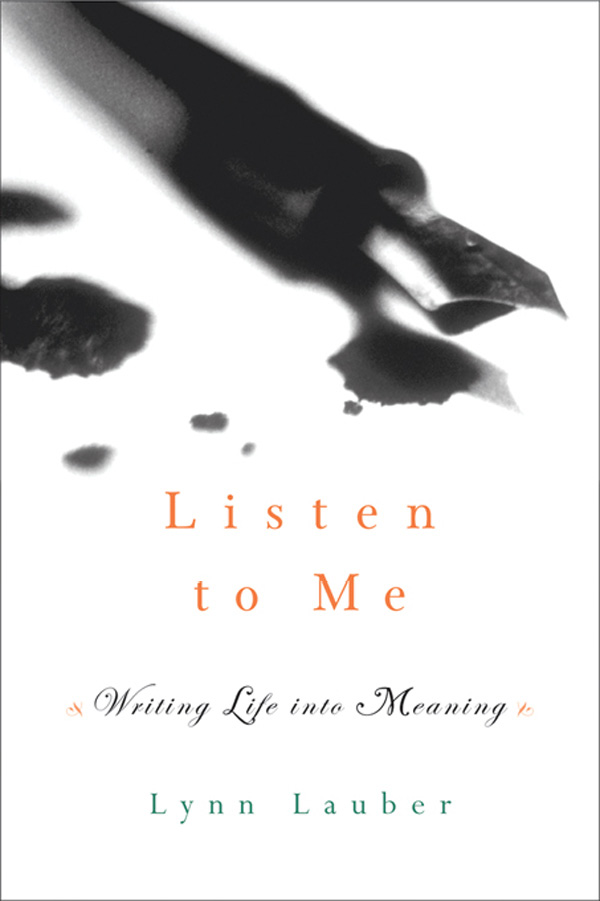
ALSO BY LYNN LAUBER
21 Sugar Street
White Girls

L ISTEN
T O M E
WRITING LIFE
INTO MEANING
LYNN LAUBER
W . W . NORTON & COMPANY
NEW YORK  LONDON
LONDON

For two beloved Roberts
Lauber and Kaplow
& Barbara Wersba

Thanks to the workshop participants who over the years have shared their livesand enriched minethrough their writing.

CONTENTS

INTRODUCTION
In many ways writing is the act of saying I, of imposing oneself upon other people, of saying listen to me, see it my way, change your mind.
JOAN DIDION
Writing can be a crucial skill, like cartography. Everybody lives in the middle of a landscape. Writing can provide a map.
PHYLLIS THEROUX
I might not have written at all if Id had another life.
If my young parents had inched further south down Route 75 and settled in Cincinnati, or Piqua, with its all-you-can-eat cafeteria, specializing in chicken gizzards and candied yams. Or if theyd moved my sophomore yearas theyd contemplated in the incipient stages of my rebellionto a school in the corn-fed suburbs, instead of having me fend my way in my miniskirts through the Rust Belt clamor of our small town.
If my father hadnt worked late summer evenings collecting insurance policy debits, had my mother not sat at a steel desk keypunching data so I could do what she had been unable to dogo to college and escape small-town lifemy destiny would have been fractured, thered be another version of me now: maybe the woman I saw staring out of her apartment door the last time I was homeblank-faced and ashen, any defiance long gone. Smoking a cigarette, the TV flashing in the background, a lank-haired daughter slumped on the couch.
This could have been me, perhaps should have been me.
Or maybe Ive had this life in order to have something to write about. For without my long, heedless rebellion, my self-inflicted troubles, there wouldnt have been so much I wanted to say.
I started writing nearly thirty years ago when I was the most lost and feckless girl imaginablea sneak, a liar, an outsiderall traits that no one ever tells you are assets for writing, even if theyre trouble out in the world.
By the time I was sixteen, Id had a child by my African-American boyfrienda child Id given up for adoption; Id become alienated from the town Id grown up in, and worn out my parents. I didnt know what would become of me.
And so I wrote... about odd, baleful girls from small places; about exile, the allure of other peoples neighborhoods, revenge. I used clichs without knowing it and imitated anyone in my path. This was writing that went on in private and remained there, work no one wanted or read or financed. And so it has mostly remained.
I also wrote about the daughter I gave up for adoption years before I ever laid eyes on her.
It was the policy of the unwed mothers home where I spent seven sodden, lethargic months for the mother to be put to sleep during labor so that the baby could be whisked off to adoption officials sight unseen.
This may have been a neat way of dealing with pesky issues of maternal attachment, but this act caused a great break between my heart and body; a network of fissures that transformed me into a walking bag of jutting bones and jangling parts.
I began to write then as a way of restoring my fractured self and calling up my phantom baby. In and out of college, with As in drama and Ds in German, in semidetached brick apartments with roaches on the walls, in cathedral-ceilinged efficiencies in Thurber Village (before I knew who Thurber was), on benches in bus terminals, I wrote on envelopes and the backs of pay stubs, and I imagined a girl who was cinnamon-colored, tea-toned, but mostly golden.
Alchemy, I was trying forI who had never heard of the word.
By handling the material of my life, picking up the facts and turning them over, exaggerating and connecting them, I became involved in navigational work, even though I wasnt aware of it at the time. In this way, writing became an act of inner charting.
Who was I far down there? What was I doing with this life of mine?
Often it seemed I didnt even know what I believed until I wrote it, as if writing were the arrow that pierced a subterranean region rich with metaphor, wisdom, and foreknowledge.
As I continued to write, and attended workshops, then began leading them myself, I saw how this was not unusual but the common experience, that most people had stories they were eager to write and that it did them some deep inner good to do so. I saw that this kind of writing gave people a way of making a crucial link between their inner and outer worlds.
Karolyn Kempner writes:
It is inherent in the nature of human beings to seek to discover and verify the meaning of life. We do not so much have to go looking for that meaning, as to let ourselves remember it, to let the meaning emerge and speak to us from the context of our lives. What is needed is an instrument and a method by which we can establish an ongoing relationship with the meaning that is already there.
It has been my experience that personal writing can go a long way in fulfilling this function; as an instrument of self-awareness and reflection, it often serves to illuminate life.
The Power of Stories
Writing is a way of listening to ourselves, putting an ear to the wall of our interiors, discerning the rustle of our souls.
It is an act of power, and many of us arent accustomed to power.
When I first attended writing workshops, the only way I could read my work was turned away, facing a wall. I wasnt accustomed to the sound of my own voice. Listen to me, I was saying, and I couldnt believe that anyone would.
The only power I knew then was from displaying my body, wearing the miniskirts I had my mother whip up on her Singer, skirts so short that if I bent over to pick up a pencil, my hind quarters were displayed as in a butcher shop.
Power was car horns and catcalls as I sashayed down local streets in my halter topsbut it was a short, flat power that left nothing in its wake except the desire to do it again, get it again.
I was well aware of my glossy exterior; I knew my emotions, which pulled me around like a renegade horse. But my mind was unknown to me, and could not be reached by the usual methods, by pop quizzes and multiple-choice questions. It was mired deep in mud, a blind fish, unaccustomed to light.
It was only through writing that I realized I was not the decorative shell I was trying so hard to impersonate.
Writing brought me down into myself.
I was joined together, reunited, through words.
This book is an account of how I have struggled to write my life into meaning, of how writing has led the way, trailing awareness in its wake. My purpose is not only to share my experience but to encourage others to explore and savor their own personal material and write about it in the deepest, truest way.
Next page

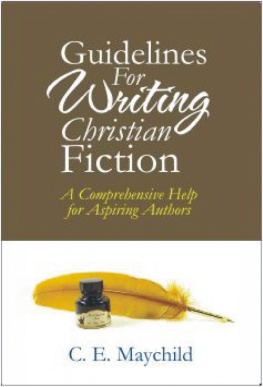
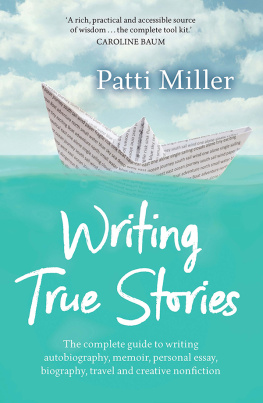
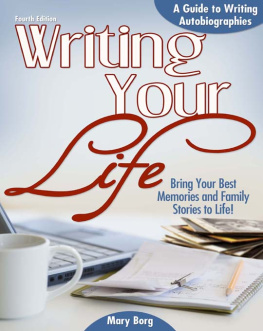
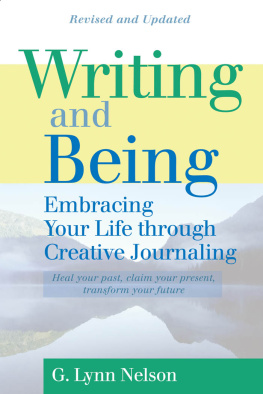
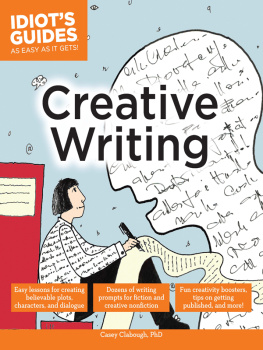
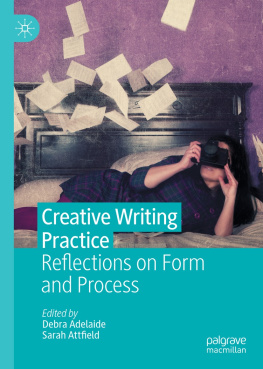
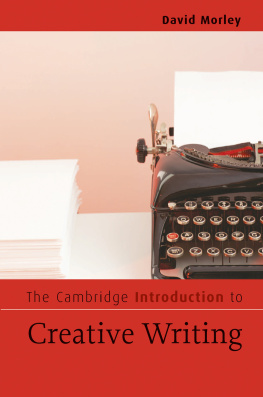


 LONDON
LONDON


